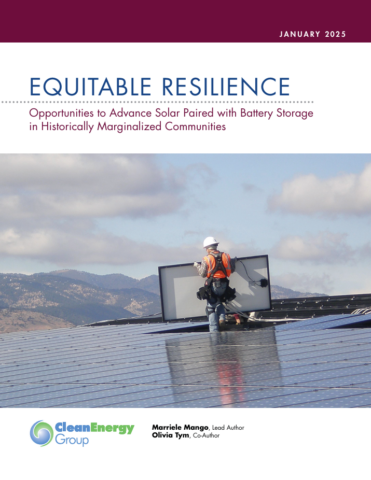Equitable Resilience: Opportunities to Advance Solar Paired with Battery Storage in Historically Marginalized Communities
January 15, 2025
Marriele Mango, Olivia Tym | Clean Energy Group
The number of solar and battery storage installations nationwide is increasing year-over-year. Yet, these technologies remain largely inaccessible to historically marginalized communities, including low-income communities, communities of color, and environmental justice communities. As power outages continue to increase in occurrence and severity – due, primarily, to more extreme weather events and the failure of outdated fossil-fuel polluting energy infrastructure – the economic, reliability, and resilience benefits of battery storage will be more important than ever.
This report by Clean Energy Group (CEG) presents findings resulting from the Resilience, Storage and Grid Benefits Community of Practice, an effort through the Equitable Solar Communities of Practice program initiative by The U.S. Department of Energy (DOE) Solar Energy Technologies Office (SETO).
CEG led the Resilience, Storage and Grid Benefits Community of Practice, which focused on the value of resilience provided by behind-the-meter solar+storage. In addition to providing insight into the meaningful benefits of battery storage – with a focus on the economic, health, and grid reliability benefits – this report prioritizes strategies that best support building resilience locally through solar+storage at critical facilities and vulnerable residences. Obstacles to equitable access and existing case studies working to overcome these obstacles are also outlined. The report concludes with an overview of best practices and recommendations to support the equitable advancement of solar and battery storage.
The report is designed to 1) educate a broad audience on the benefits of solar paired with battery storage, 2) identify barriers to equitable access of solar and battery storage, and 3) amplify best practices and innovative programs that improve battery storage access across the nation. The report concludes with program and policy recommendations to advance equitable access to solar and battery storage technologies.
This report was produced with key guidance and contributions from a Resilience Community of Practice Core Team consisting of six organizations: the Smart Electric Power Alliance, Massachusetts Clean Energy Center, Northwest Arctic Borough, Together Louisiana, Appalachian Voices, and ReVision Energy.





